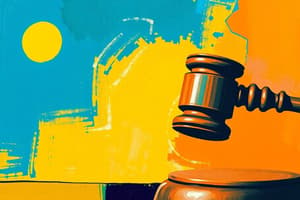Podcast
Questions and Answers
The law of tort owes its development to judicial pronouncements.
The law of tort owes its development to judicial pronouncements.
True (A)
Tort infringes the right in rem.
Tort infringes the right in rem.
False (B)
Libel is the publication of a defamatory statement in transient form.
Libel is the publication of a defamatory statement in transient form.
False (B)
Under tort damages may be liquidated.
Under tort damages may be liquidated.
All civil wrongs are tort.
All civil wrongs are tort.
The tortious liability stands discharged if the plaintiff dies.
The tortious liability stands discharged if the plaintiff dies.
As far as private defence concerned it is not available in tort.
As far as private defence concerned it is not available in tort.
There are many exceptions to absolute liability.
There are many exceptions to absolute liability.
Private nuisance is a crime.
Private nuisance is a crime.
Act of God arises out of working of natural forces.
Act of God arises out of working of natural forces.
What is false imprisonment in tort?
What is false imprisonment in tort?
What is res ipsa loquitur?
What is res ipsa loquitur?
Flashcards
Law of Torts Development
Law of Torts Development
The law of torts is primarily developed through court decisions (judicial pronouncements).
Tort and Right in rem
Tort and Right in rem
Torts typically infringe personal rights (rights in personam), not property rights (rights in rem).
Libel Definition
Libel Definition
Libel is a defamatory statement published in a permanent form (like a written article).
Tort Damages Liquidated
Tort Damages Liquidated
Signup and view all the flashcards
Civil Wrongs & Torts
Civil Wrongs & Torts
Signup and view all the flashcards
Plaintiff Death & Tort Liability
Plaintiff Death & Tort Liability
Signup and view all the flashcards
Private Defense in Tort
Private Defense in Tort
Signup and view all the flashcards
Absolute Liability Exceptions
Absolute Liability Exceptions
Signup and view all the flashcards
Private Nuisance and Crime
Private Nuisance and Crime
Signup and view all the flashcards
Act of God & Natural Forces
Act of God & Natural Forces
Signup and view all the flashcards
False Imprisonment (Tort)
False Imprisonment (Tort)
Signup and view all the flashcards
Res Ipsa Loquitur
Res Ipsa Loquitur
Signup and view all the flashcards
Study Notes
Law of Torts, M.V. Act and Consumer Protection Act
- Paper: 3.3
- Full Marks: 80
- Time: Three hours
True or False Statements
- (a) The law of tort owes its development to judicial pronouncements. (True/False)
- (b) Tort infringes the right in rem. (True/False)
- (c) Libel is the publication of a defamatory statement in transient form. (True/False)
- (d) Under tort damages may be liquidated. (True/False)
- (e) All civil wrongs are tort. (True/False)
- (f) The tortious liability stands discharged if the plaintiff dies. (True/False)
- (g) As far as private defense is concerned, it is not available in tort. (True/False)
- (h) There are many exceptions to absolute liability. (True/False)
- (i) Private nuisance is a crime. (True/False)
- (j) Act of God arises out of working of natural forces. (True/False)
Additional Questions
- (c) What is false imprisonment in tort?
- (d) What is res ipsa loquitur?
Studying That Suits You
Use AI to generate personalized quizzes and flashcards to suit your learning preferences.





